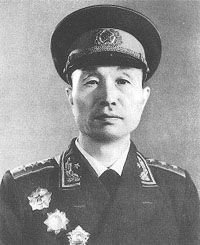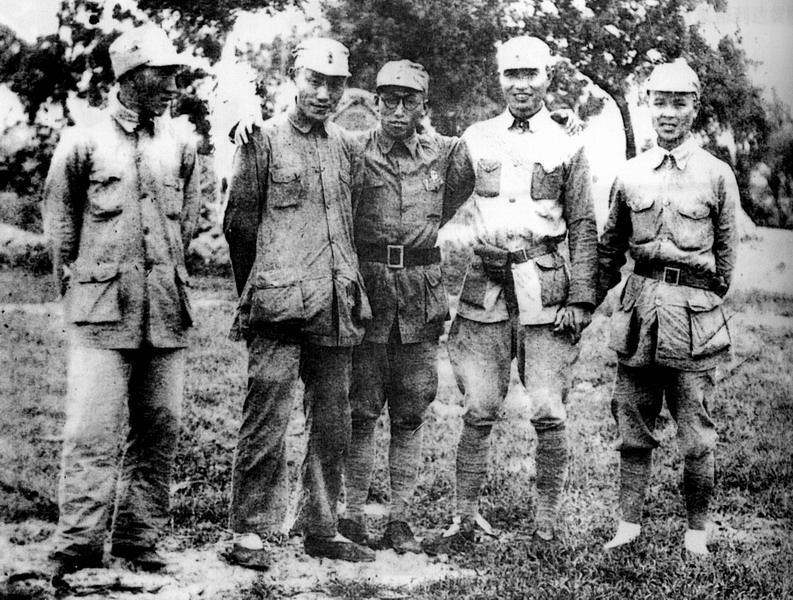Zhang Aiping on:
[Wikipedia]
[Google]
[Amazon]
 Zhang Aiping (; born January 9, 1910 in Da County,
Zhang Aiping (; born January 9, 1910 in Da County,
 Zhang joined the
Zhang joined the
 Zhang Aiping (; born January 9, 1910 in Da County,
Zhang Aiping (; born January 9, 1910 in Da County, Sichuan
Sichuan (; zh, c=, labels=no, ; zh, p=Sìchuān; alternatively romanized as Szechuan or Szechwan; formerly also referred to as "West China" or "Western China" by Protestant missions) is a province in Southwest China occupying most of the ...
; died July 5, 2003 in Beijing
}
Beijing ( ; ; ), alternatively romanized as Peking ( ), is the capital of the People's Republic of China. It is the center of power and development of the country. Beijing is the world's most populous national capital city, with over 21 ...
) was a Chinese military leader.
Biography
 Zhang joined the
Zhang joined the Communist Party of China
The Chinese Communist Party (CCP), officially the Communist Party of China (CPC), is the founding and sole ruling party of the People's Republic of China (PRC). Under the leadership of Mao Zedong, the CCP emerged victorious in the Chinese Civil ...
in 1928 after taking part in a communist-led rural uprising. He participated in the Long March
The Long March (, lit. ''Long Expedition'') was a military retreat undertaken by the Chinese Red Army, Red Army of the Chinese Communist Party (CCP), the forerunner of the People's Liberation Army, to evade the pursuit of the National Revolut ...
and served as a field commander in the Chinese Red Army, first fighting against Chiang Kai-shek
Chiang Kai-shek (31 October 1887 – 5 April 1975), also known as Chiang Chung-cheng and Jiang Jieshi, was a Chinese Nationalist politician, revolutionary, and military leader who served as the leader of the Republic of China (ROC) from 1928 ...
's Kuomintang
The Kuomintang (KMT), also referred to as the Guomindang (GMD), the Nationalist Party of China (NPC) or the Chinese Nationalist Party (CNP), is a major political party in the Republic of China, initially on the Chinese mainland and in Tai ...
forces, and later the Imperial Japanese Army
The was the official ground-based armed force of the Empire of Japan from 1868 to 1945. It was controlled by the Imperial Japanese Army General Staff Office and the Ministry of the Army, both of which were nominally subordinate to the Emperor o ...
in the Second Sino-Japanese War
The Second Sino-Japanese War (1937–1945) or War of Resistance (Chinese term) was a military conflict that was primarily waged between the Republic of China and the Empire of Japan. The war made up the Chinese theater of the wider Pacific Th ...
. During World War II
World War II or the Second World War, often abbreviated as WWII or WW2, was a world war that lasted from 1939 to 1945. It involved the vast majority of the world's countries—including all of the great powers—forming two opposin ...
Zhang commanded a guerrilla band sent to rescue U.S. flight crews who crash landed in China following the April 1942 Tokyo bombing raid led by Lieutenant Colonel Jimmy Doolittle
James Harold Doolittle (December 14, 1896 – September 27, 1993) was an American military general and aviation pioneer who received the Medal of Honor for his daring raid on Japan during World War II. He also made early coast-to-coast flights ...
.
After 1949, Zhang was an important builder of the Chinese military forces. He commanded the first People's Liberation Army
The People's Liberation Army (PLA) is the principal military force of the People's Republic of China and the armed wing of the Chinese Communist Party (CCP). The PLA consists of five service branches: the Ground Force, Navy, Air Force, ...
naval force
A navy, naval force, or maritime force is the branch of a nation's armed forces principally designated for naval and amphibious warfare; namely, lake-borne, riverine, littoral, or ocean-borne combat operations and related functions. It inc ...
and served as an army corps commander in the Korean War
, date = {{Ubl, 25 June 1950 – 27 July 1953 (''de facto'')({{Age in years, months, weeks and days, month1=6, day1=25, year1=1950, month2=7, day2=27, year2=1953), 25 June 1950 – present (''de jure'')({{Age in years, months, weeks a ...
. Upon his return home he served in a series of significant military and political posts. He was made a General in 1955.
Zhang was accused of counterrevolutionary crimes and dismissed from all positions during the Cultural Revolution
The Cultural Revolution, formally known as the Great Proletarian Cultural Revolution, was a sociopolitical movement in the People's Republic of China (PRC) launched by Mao Zedong in 1966, and lasting until his death in 1976. Its stated goal ...
, when many veteran communists were attacked by Red Guards
Red Guards () were a mass student-led paramilitary social movement mobilized and guided by Chairman Mao Zedong in 1966 through 1967, during the first phase of the Cultural Revolution, which he had instituted.Teiwes According to a Red Guard lead ...
inspired by Mao Zedong
Mao Zedong pronounced ; also romanised traditionally as Mao Tse-tung. (26 December 1893 – 9 September 1976), also known as Chairman Mao, was a Chinese communist revolutionary who was the founder of the People's Republic of China (PRC) ...
's vision of continuous revolution, and one of his legs was broken as a result. Later, Zhang would comment: "The only thing the Cultural Revolution succeeded in was giving me a cane." He reappeared in 1973 and served as defense minister from 1982 until 1988. He served as deputy chief of the PLA general staff, vice premier, and chaired a key commission that sought to modernize the PLA.
During the Tiananmen Square protests of 1989
The Tiananmen Square protests, known in Chinese as the June Fourth Incident (), were student-led demonstrations held in Tiananmen Square, Beijing during 1989. In what is known as the Tiananmen Square Massacre, or in Chinese the June Fourth ...
, Zhang Aiping signed a letter opposing the enforcement of martial law by the Army in Beijing.
Zhang Aiping died in Beijing at the age of 93.
See also
*List of officers of the People's Liberation Army
This is a list of marshals and full generals and admirals of the People's Republic of China, including all branches of the People's Liberation Army and the People's Armed Police.
Marshals
Ten PLA officers were awarded the rank of Marshal ('' ...
References
{{DEFAULTSORT:Zhang, Aiping 1910 births 2003 deaths Ministers of National Defense of the People's Republic of China Chinese military personnel of World War II People's Liberation Army generals from Sichuan Politicians from Dazhou Chinese Communist Party politicians from Sichuan People's Republic of China politicians from Sichuan Victims of the Cultural Revolution State councillors of China Burials at Babaoshan Revolutionary Cemetery